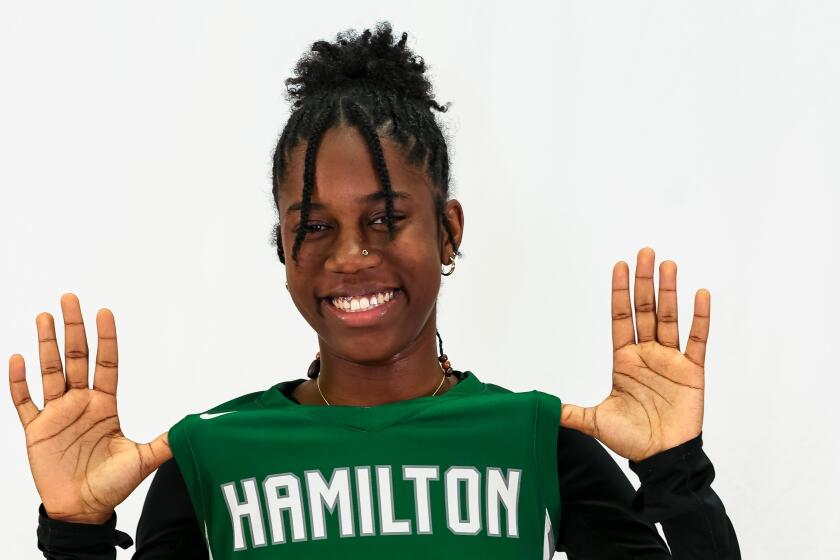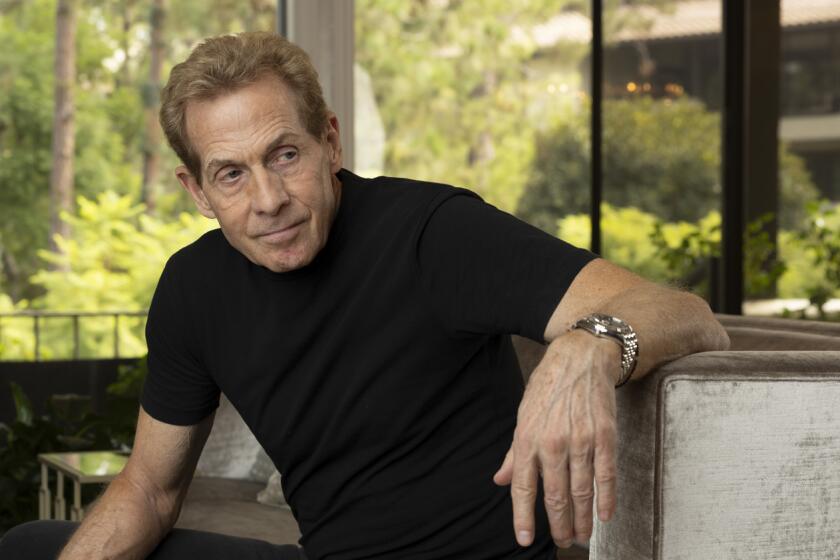Objectivity Lost in Owens’ Story
In the newspaper business, the editors who make decisions on how a story will be covered have the luxury of time. They have time to analyze a situation, edit the ensuing story or stories and decide what kind of play those stories deserve.
The story of Terrell Owens’ possible suicide attempt Tuesday night was first reported by Dallas television station WFAA the next morning about 6:30 PDT.
The Times had sent a reporter to Dallas, had another reporter in Los Angeles begin working the phones, and had J.A. Adande weigh in with his view. But by the end of the day, the story got a one-column headline, as did Adande’s column.
ESPN, which enjoys the immediacy that television and radio provide but not the time to fully evaluate the importance of a news event, gave this one -- in newspaper terms -- a banner headline in capital letters.
By 8 a.m. PDT, when the next edition of “SportsCenter” went on the air, ESPN was in high gear, and by 10 a.m., ESPN preempted regularly scheduled programming for four hours of nonstop T.O.
Bob Ley, possibly ESPN’s best journalist, and Trey Wingo anchored the coverage.
The problem was the network then had a lot of time to fill without much solid information. Also, ESPN is an all-sports network and is not as accustomed as CNN, MSNBC or Fox News to such full-bore coverage of what it regarded as a major news event.
As a result, Michael Irvin and other former football players-turned-broadcasters who work for ESPN suddenly were asked to be reporters.
Irvin’s relationship with Owens and Owens’ publicist, Kim Etheredge, did give him inside information. But it also led Irvin to sound more like an apologist for Owens than an objective reporter.
“I’m a football analyst, not a reporter,” Irvin said Thursday in a phone interview. “But I became a reporter.” Only one with no journalistic training.
He told viewers Wednesday that he had talked with Owens earlier Tuesday by phone and found him to be cheerful and fine. He also said on the air that he had talked to Etheredge on Tuesday night when she was at the hospital and that she told him the same thing she told a room full of reporters Wednesday morning -- that Owens had had an allergic reaction to pain pills and supplements.
During Thursday’s phone interview, Irvin said he had tried to avoid giving opinions because “this was far too serious a situation for us to get opinionated about.”
But Irvin, whether aware of it or not, did step over the journalistic line by expressing sympathy for his friend in his on-air report.
Deion Sanders, however, ran well past that line in his own Wednesday on-air report for NFL Network, where he is employed as a football analyst. Sanders, who lives in Dallas, went to Owens’ house -- at Owens’ request. Then, after visiting inside the house, viewers heard Sanders say, “Let’s say a prayer for T.O.”
Irvin said Thursday it was a mistake for Sanders to go to Owens’ house. “I wouldn’t have done it,” he said. “My first obligation is to ESPN -- that is my job. By Deion going over there, he became part of the story.”
So did Irvin, although to a lesser degree, by not remaining objective from beginning to end. But it was hard for Irvin and many of his ESPN colleagues, especially those not trained as reporters, to avoid expressing personal opinions when there was so much air time to fill.
Such pressure can lead even trained broadcast reporters to slip up, saying things that are mere speculation rather than fact.
It’s like when local television used to be so obsessed with police chases. Anchors would say the oddest things whenever there was nonstop coverage.
One example of that from the Owens coverage came when Keith Olbermann, on Dan Patrick’s ESPN Radio show Wednesday, talked about his own thoughts of suicide -- before he sought help from a psychiatrist.
Colin Cowherd devoted most of the time on his ESPN Radio morning show the last two days to Owens. Cowherd described the whole thing as a media circus, adding, “Sometimes you watch the circus and you laugh and cringe and wince.”
The chief of ESPN’s news division is Vince Doria, sports editor of the Boston Globe from 1975 to ’89. He said Thursday that the network was justified in giving the story the attention it did because of Owens’ notoriety.
But Doria sees the pitfalls.
“On a story like this, it’s tough to advance the ball reporting-wise because of the lack of information coming in,” he said. “You have to be careful. You can’t speculate about mental health the way you can about a major trade. We may have stepped over the line a few times, but overall I thought we were pretty responsible.”
Doria pointed out that the ratings for the Owens coverage were more than double what the normal ESPN programming would be for that time period. “I think that’s an indication we served the viewers well,” he said.
More to Read
Go beyond the scoreboard
Get the latest on L.A.'s teams in the daily Sports Report newsletter.
You may occasionally receive promotional content from the Los Angeles Times.










